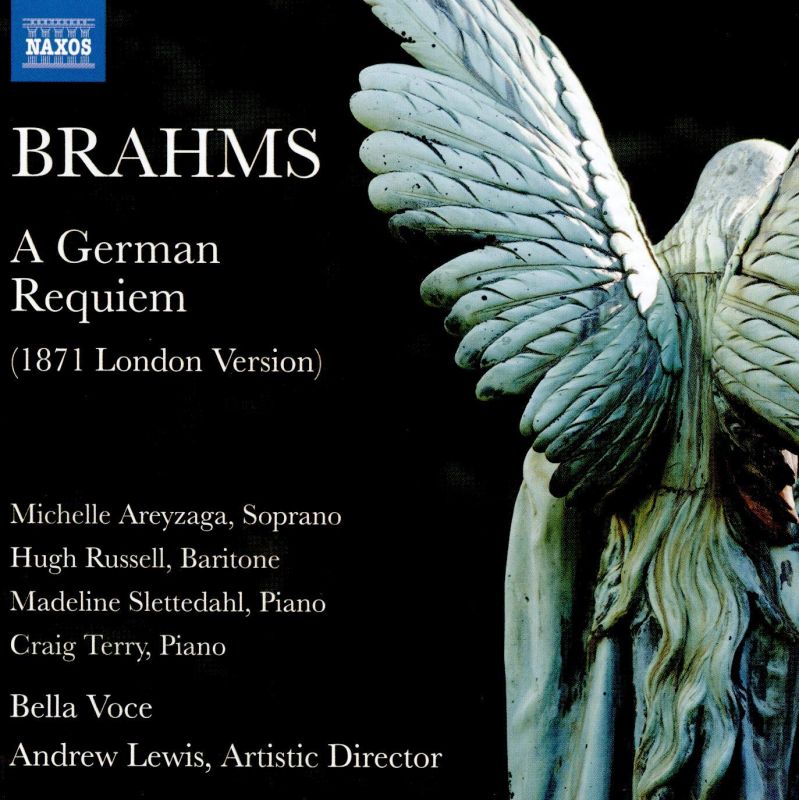BRAHMS A German Requiem (1871 London Version. Lewis)
View record and artist detailsRecord and Artist Details
Composer or Director: Johannes Brahms, Andrew Lewis
Genre:
Vocal
Label: Naxos
Magazine Review Date: 01/2020
Media Format: CD or Download
Media Runtime: 66
Mastering:
DDD
Catalogue Number: 8 573952

Tracks:
| Composition | Artist Credit |
|---|---|
| (Ein) Deutsches Requiem, 'German Requiem' |
Johannes Brahms, Composer
Andrew Lewis, Composer Bella Voce Craig Terry, Piano Hugh Russell, Baritone Johannes Brahms, Composer Madeleine Slettedahl, Piano Michelle Areyzaga, Soprano |
Author: Peter Quantrill
Contributions to the booklet from Katy Hamilton and the conductor Andrew Lewis make a persuasive case for this downsized, vernacular version of the German Requiem. Apparently playing four hands on a single piano, Madeline Slettedahl and Craig Terry set the sober mood and the steady pace of the second movement’s obsequies. They are unfailingly sensitive to Lewis’s rubato in the movements of repose, but an air of the rehearsal room lingers all the same. Perhaps the sound of the piano itself is at fault – hollow and tonally parched – but that doesn’t account for the heavy-handed imitation of timpani rolls to open the third movement, or the prosaically clipped articulation to accompany Michelle Areyzaga, who breaks her opening line in the middle and initially sounds none too comfortable as a bestower of maternal or angelic peace.
Both she and Hugh Russell sing with wider vibrato than we are now used to in this music, making an awkward fit with the designedly English-cathedral style of the choir. This is a well-blended, Chicago-based outfit of 34 voices, fielding a mixed alto section that Brahms would surely not have envisaged, and slightly stronger in the upper than lower parts. Still, moments of strain in a work of chorally exigent demands are few and far between, and if the accustomed contrasts of scale are minimised in the Requiem’s two great narrative pillars, placed third and sixth, so they are in almost every other ‘London version’ recording.
The exception to the rule, it seems to me with a little hindsight, is the Delphian recording with the Choir of King’s College London (12/17). Joseph Fort’s direction is more strongly marked, his soloists in fresher and more appealing voice, his pianists much more harmoniously recorded. Their sung text is the Victorian-era Traquair/Benson version, with discreet tweaks to the underlay, whereas Bella Voce use a recent translation prepared by Lara Hoggard, a contemporary of Robert Shaw who died in 2007.
Without recourse to iconoclasm – the fourth movement’s dwellings are as lovely as ever – Hoggard’s translation is subtly updated (‘you’ rather than ‘ye’), more faithful to the Biblical text and often falling more gratefully on the voice and the musical sense of the phrase, if not always the ear. To focus on the soprano solo, there is no doubt that ‘Grieve not’ makes for a more singable expression than ‘Howbeit’, but ‘You’ closes the vowel unhelpfully at the opening of the phrase, while ‘and I have found’ cannot be counted an improvement on the distinct definition of ‘but at the last’ in the same place. In sum, ‘the spirit speaks’, but at mezzo-forte.
Discover the world's largest classical music catalogue with Presto Music.

Gramophone Digital Club
- Digital Edition
- Digital Archive
- Reviews Database
- Full website access
From £8.75 / month
Subscribe
Gramophone Full Club
- Print Edition
- Digital Edition
- Digital Archive
- Reviews Database
- Full website access
From £11.00 / month
Subscribe
If you are a library, university or other organisation that would be interested in an institutional subscription to Gramophone please click here for further information.




